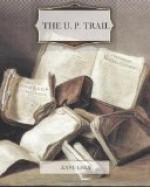What a wide and wonderful prospect opened up to view from this lofty point! Ridge after ridge sloped up to the Wyoming hills, and these in turn raised their bleak, dark heads toward the mountains, looming pale and gray, with caps of snow, in the distance. Out beyond the ridges, indistinct in the glare, stretched an illimitable expanse, gray and dull—that was the prairie-land. An eagle, lord of all he surveyed, sailed round and round in the sky.
Below this grassy summit yawned a valley, narrow and long, losing itself by turns to distant east and west; and through it ran a faint, white, winding line which was the old St. Vrain and Laramie Trail.
There came a moment when the wavering in the grass ceased on the extreme edge of the slope. Then it parted to disclose the hideous visage of a Sioux Indian in war paint. His dark, piercing, malignant glance was fixed upon the St. Vrain and Laramie Trail. His half-naked body rested at ease; a rifle lay under his hand.
There he watched while the hours passed. The sun moved on in its course until it tipped the peaks with rose. Far down the valley black and white objects appeared, crawling round the bend. The Indian gave an almost imperceptible start, but there was no change in his expression. He watched as before.
These moving objects grew to be oxen and prairie-schooners—a small caravan traveling east. It wound down the trail and halted in a circle on the bank of a stream.
The Indian scout slid backward, and the parted grass, slowly closing, hid from his dark gaze the camp scene below. He wormed his way back well out of sight; then rising, he ran over the summit of the ridge to leap upon his mustang and ride wildly down the slope.
3
Bill Horn, leader of that caravan, had a large amount of gold which he was taking back East. No one in his party, except a girl, knew that he had the fortune.
Horn had gone West at the beginning of the gold strikes, but it was not until ’53 that any success attended his labors. Later he struck it rich, and in 1865, as soon as the snow melted on the mountain passes, he got together a party of men and several women and left Sacramento. He was a burly miner, bearded and uncouth, of rough speech and taciturn nature, and absolutely fearless.
At Ogden, Utah, he had been advised not to attempt to cross the Wyoming hills with so small a party, for the Sioux Indians had gone on the war-path.
Horn was leading his own caravan and finding for himself the trail that wound slowly eastward. He did not have a scout or hunter with him. Eastward-traveling caravans were wont to be small and poorly outfitted, for only the homesick, the failures, the wanderers, and the lawless turned their faces from the Golden State. At the start Horn had eleven men, three women, and the girl. On the way he had killed one of the men; and another, together with his wife, had yielded to persuasion of friends at Ogden and had left the party. So when Horn halted for camp one afternoon in a beautiful valley in the Wyoming hills there were only nine men with him.




